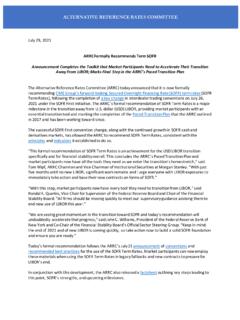Transcription of Frequently Asked Questions - IRS tax forms
1 IRC Section 6050W Frequently Asked Questions What are payment settlement entities? Payment settlement entities are the organizations responsible for reporting the payments made to participating payees. A payment settlement entity may be a domestic or foreign entity. For payment card transactions, merchant acquiring entities are the payment settlement entities, and for third party network transactions, third-party settlement organizations are the payment settlement entities. What is a third-party settlement organization? A third-party settlement organization is a central organization that has the contractual obligation to make payments to participating payees (generally, a merchant) in a third party payment network. Characteristics of a third party payment network include: (i) the existence of a central organization with whom providers of goods and services have established accounts, (ii) an agreement between the central organization and providers to settle transactions between the providers of goods and services and purchasers, (iii) the establishment of standards and mechanisms for settling such transactions and (iv) the guarantee of payment in settlement of such transactions.
2 The most common example of a third-party settlement organization is an online auction-payment facilitator, which operates merely as an intermediary between buyer and seller by transferring funds between accounts in settlement of an auction/purchase. Third-party settlement organizations charge sellers a fee for facilitating the transaction. Under the reporting requirements, these entities must report the gross reportable transactions of the businesses to which they make payments provided the payee satisfies certain transaction volume and dollar thresholds. What is a merchant acquiring entity? Often called an acquiring or merchant bank, a merchant acquiring entity is the bank or other organization that processes credit card transactions on behalf of a merchant and ultimately transfers the funds received from the customer s bank (called an issuing bank ) to the merchant s account.
3 Initially, a merchant acquiring entity processes a request after a merchant swipes a customer s card, and notifies a merchant when the card has been accepted. Merchant acquiring entities charge merchants a fee for facilitating their charge transactions. Merchant acquiring banks are responsible for reporting merchants reportable payment card transactions. 1 | Page What is a payee? A payee (or participating payee ) is any person that accepts a payment card as payment, or in the case of a third party network transaction, any person that accepts payment made by a third party settlement organization on behalf of the purchaser or customer. Who is responsible for reporting merchant card payments? The merchant acquiring entity that transfers funds to the participating payee is responsible for reporting the gross amount of reportable transactions.
4 Who is responsible for reporting third party network transactions? The third-party settlement organizations are responsible for reporting the gross amounts of reportable transactions paid to participating payees in their network. Whose merchant card payments must be reported? Merchant acquiring entities must report the gross amount of reportable transactions of any payee for whom they settle payment card transactions. A reportable payment card transaction is any payment in which a payment card or any indicia thereof (such as a credit card number) is accepted as payment. Whose third-party network transactions must be reported? Third-party settlement organizations must report the gross amounts of reportable transactions of any payee for whom they settle payments using their network provided that a payee s reportable transactions exceed $20,000 and the aggregate number of those transactions exceeds 200.
5 Why is this reporting necessary? The reporting is required by law. Third-party information reporting has been shown to increase voluntary tax compliance, improve collections and assessments within IRS, and thereby reduce the tax gap. With third-party reporting of payment card revenue and third party network transactions, the IRS has the means of instituting a robust business matching program, similar to the successful matching program already in use which verifies amounts reported on individual returns and identifies individual nonfilers. 2 | Page How are reportable transactions to be reported? Will there be a new form ? Payment settlement entities will report gross transaction amounts on the new form 1099-K, Merchant Card and Third-Party Payments.
6 What information must be reported? The form requires reporting, with respect to any one payee, of the gross amount of reportable transactions for the calendar year and its corresponding months. The reporting of both annual and monthly amounts is necessary in order to reconcile differences between information returns and tax returns of fiscal year filers. The name, address, and taxpayer identification number of each participating payee must also be included on the form . When are forms 1099-K due? Under the new law, information reporting for payment card and third party network transactions are due to the IRS by February 28 (March 31, if filed electronically), of the year following the transactions. The first 1099-Ks will be due for calendar year 2011, and must be submitted to the IRS by February 28, 2012 (March 31, 2012 if filed electronically).
7 Can forms 1099-K be filed electronically? Yes, there will be protocol for the electronic submission of form 1099K. In fact, if a payment settlement entity must submit more than 250 individual information returns in any calendar year, all must be submitted electronically. Information about electronic filing of form 1099-K can be found on the web at What are payee statements and when are they due? Payment settlement entities must furnish a payee statement showing the information reported to the IRS on form 1099-K to each participating payee. The statements must be provided by the reporting entity to the payee by January 31 of the year following the calendar year for which the return was made. The first payee statements must be furnished by January 31, 2012. Can payee statements be submitted electronically?
8 Yes, they may be provided electronically. Consent for receipt of electronic statements must first be provided by the payee. Consent can be granted electronically. See Treasury regulations 3 | Page section for instructions for receiving consent from payees. If a payee statement is submitted electronically, an email address for the reporting entity may be provided in lieu of a phone number. What is the de minimis standard for reporting? Does it apply to payment card transactions? The de minimis standard exempts the reporting of transactions settled by a third party settlement organization of a payee in a third party payment network if the aggregate payments to the payee do not exceed $20,000 or if the aggregate number of transactions does not exceed 200.
9 This applies only to the payments settled by third-party settlement organizations. The de minimis standard does not apply to payment card transactions. What constitutes the gross amount of reportable transactions? Does the gross amount include fees, charge-backs or other costs and refunded amounts? The gross amount of reportable transactions means the total dollar amount of aggregate transactions without regard to any credits, charge-backs, fees, cash equivalents, discounts, refunds, or any other amounts. The gross amount is strictly the total dollar value paid to the participating payees before any fees, refunds, or any other amounts are considered. Why do the regulations require that merchant acquiring entities report the gross amount of transactions?
10 Wouldn t it make more sense to report the net amount without fees, charge-backs, The regulations require the reporting of the gross amount of transactions because the statute specifically requires reporting of the gross amount. Are foreign payment settlement entities subject to the reporting requirements? Yes, the statute and regulations establish that a payment settlement entity may be a domestic or foreign entity. 4 | Page Are payment settlement entities required to report the transactions of governmental units, whether state or federal? Yes. The term participating payees includes any governmental unit as well as any agency or instrumentality thereof. What qualifies as a payment card ? Under the regulations, a payment card is a card, issued to a cardholder that a network of unrelated persons has agreed to accept as payment under an agreement that provides standards and mechanisms for settling the transactions between a merchant acquiring bank or similar entity and the providers who accept the cards as payment.















